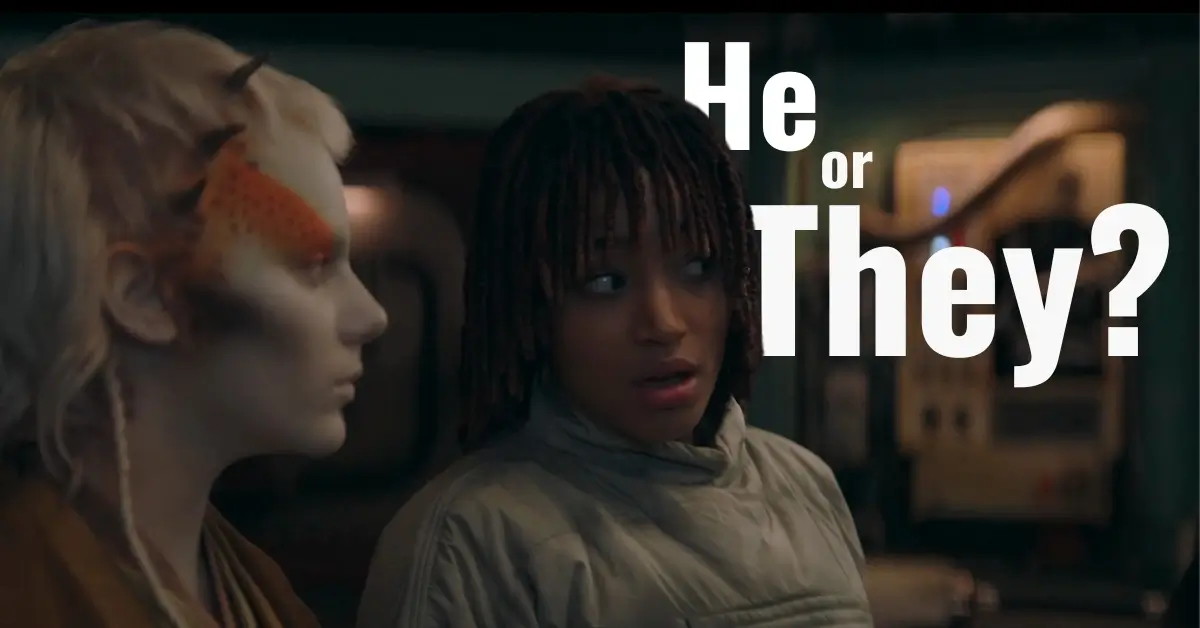In a galaxy far, far away, “Star Wars: The Acolyte” has stirred the pot yet again. The latest episode features a scene where a character, Bazil, is referred to with a question about pronouns.
This moment has sparked a significant amount of discussion online, with reactions ranging from support to outright outrage. But what exactly is going on, and why has it struck such a nerve?
So, what’s the deal with the pronoun scene in The Acolyte?
Following the “Space Witches” controversy from episode 3, in the fourth episode, Osha, played by Amandla Stenberg, inquires about Bazil, a Tynnan tracker, asking, “Is he, or they, with us?” This pronoun scene has been criticized for injecting modern “woke” politics into the Star Wars universe, but screenwriter Claire Kiechel clarified this was intended as a joke.
Is “The Acolyte” Pushing Modern Politics into Star Wars?
Since its debut, “The Acolyte” has been a hot topic. Thanks to its progressive themes and characters, the show has already been labeled as the “gayest Star Wars yet.”
In the fourth episode of “The Acolyte,” Osha, portrayed by Amandla Stenberg, finds herself amidst an eclectic group of new Jedi companions. As she surveys the group, her eyes fall on a small, otter-like creature sniffing around curiously. Turning to Jecki Lon, played by Dafne Keen, Osha asks, “Who is that?”
Jecki, with a slight smile, replies, “That’s Bazil.”
Osha, still unsure, inquires, “Is he, or they, with us?”
The exchange leaves viewers momentarily puzzled as the scene moves on, blending the fantasy of the Star Wars universe with a touch of contemporary dialogue. This sparked debate, with some fans accusing the show of pushing modern political agendas into the franchise.
Soon, this caught on like wildfire, and people were bashing the already hated show even more.
Screenwriter Claire “CK” Kiechel quickly responded to the backlash on Twitter. She clarified that the line was meant to be a light-hearted joke about the pronouns of a large, fictional beaver-like creature, not a political statement.
“It was a joke about the pronouns of a large fictional beaver creature? No politics involved.”
Kiechel posted on X (formerly Twitter).
Yet, not everyone was convinced as they blamed her for the terrible writing and she had to now hide her account into being private.
Reactions to the scene have been mixed, with a significant portion of the fanbase expressing dissatisfaction. David Shapiro, a vocal critic, stated on X, “Disney ruins another series. Disney’s latest episode of Star Wars: The Acolyte features a scene with the use of they/them pronouns.”
This sentiment is echoed by many who feel that Disney is focusing too much on being politically correct rather than staying true to the core of Star Wars.
On the other hand, some fans and commentators defended the scene. They argue that inclusion and representation are crucial in modern storytelling. For instance, ScreenRant’s “Star Wars” editor, Thomas Bacon, noted that Star Wars has always evolved with its audience and that reflecting contemporary values is part of that growth.
Yet, this isn’t the first time “The Acolyte” has been under fire. The show previously faced criticism for its portrayal of an all-female society using the Force to impregnate a woman without any male involvement. This episode was described by some as clashing with established Star Wars lore, particularly the origins of Anakin Skywalker.
The pronoun scene in “The Acolyte” is part of a broader trend in Hollywood where inclusivity and representation are being more prominently featured. Shows like “Star Trek: Discovery” and “Doctor Who” have also included non-binary and genderqueer characters, sometimes to mixed reviews. For many fans, these efforts feel like forced attempts to modernize classic franchises, while others see them as necessary steps toward broader representation.
In “The Acolyte,” the choice to highlight Bazil’s pronouns can be seen as both a genuine attempt at inclusivity and a somewhat awkward execution.
Critics argue that singling out Bazil, a character who looks markedly different, for a pronoun question, feels like othering rather than normalizing non-binary identities. This is compounded by the fact that other characters’ pronouns are not similarly questioned, and to add to it, some say Bazil is a “he” (mentioned in Star Wars Wiki too).
It’s a delicate balance for writers and creators, which they often keep missing these days. On one hand, they want to reflect the diverse reality of their audience. On the other hand, they risk alienating long-time fans who feel these elements disrupt the established universe. This controversy highlights the ongoing struggle within the entertainment industry to navigate these changes thoughtfully and effectively.
If you ask us, we wouldn’t try any of that if we were making a TV show that had already been criticized for being woke or ruined by us. At some point, we got to learn, and we don’t have a streaming service or a huge adventure park to increase prices to cover our losses here.
“The Acolyte” echoes the broader shifts in society and media. The inclusion of diverse characters and themes is not just about being politically correct but about creating a universe that mirrors the diversity of its audience. Whether this approach will pay off for Disney and the Star Wars franchise remains to be seen.
What do you think about the inclusion of pronouns in shows like “The Acolyte”? Does it enhance the story or feel out of place?

